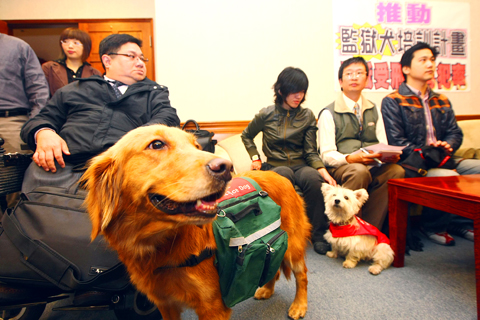Animal activists yesterday called on the Ministry of Justice to help push the cell dog program — in which inmates are taught to train stray dogs so that the dogs can be prepared for adoption — saying that the program has proven successful abroad and significantly lowers re-offending rates.
“In the cell dog program, inmates are taught to be professional dog trainers and teach stray dogs basic obedience,” Taiwan Cell Dogs Program founder Cathy Tai (戴昌儀) said.
Not only do the stray dogs get a second chance at life, since with the training they have a better chance of being adopted instead of being put down, Tai said, “Inmates in turn have love and compassion reintroduced into their lives, because, as most stray dogs have been abandoned or mistreated, the inmates have to exert extra patience and love to reach out to the dogs.”

PHOTO: CNA
Tai, a music teacher at Taipei’s Jinou Girls High school, said that she first learned about cell dogs three years ago from a TV program on Animal Planet, which featured 11 US prisons running the program.
“The cell dog program was invented by Sister Pauline Queens in 1981 and has been running in US prisons for more than two decades. Statistics show that they reduce recidivism by 60 percent,” Tai said.
In the cells, inmates involved in the program also demonstrate better behavior and less violence than those who aren’t, she said.
The program is now helping rehabilitate inmates in all 50 states of the US, Italy, the UK, Japan, Korea and many other countries, she said, adding. “In the US, some of the dogs have even been trained to be guide dogs.”
In Taiwan, volunteer veterinarians from National Pingtung University of Science and Technology began treating stray dogs three years ago. They then sent the dogs to Hsinchu City Jail for inmates to train, Tai said.
A total of 18 dogs have been adopted so far, Tai said, and hundreds of people are now on the prison’s waiting list for dogs.
“This is a social program that benefits society as a whole. In addition to the benefits to the strays and inmates, people can reap the benefits of improved public safety,” she said.
However, Tai said that currently Hsinchu is the only jail out of the nation’s 23 jails to have adopted the program, adding that it faces obstacles because “most prison wardens feel that it is extra work for them.”
As such, Tai called on the Ministry of Justice to back the program by making it eligible for part of the prison wardens’ annual job performance review, adding that it could also be a part of inmates’ parole evaluations.
“Meanwhile, my group of volunteers will continue to fundraise for the cause so that this program can carry on long-term,” she said.
To learn more about cell dogs, visit the program’s bilingual Web site at www.celldog.tw.

Taiwanese can file complaints with the Tourism Administration to report travel agencies if their activities caused termination of a person’s citizenship, Mainland Affairs Council Minister Chiu Chui-cheng (邱垂正) said yesterday, after a podcaster highlighted a case in which a person’s citizenship was canceled for receiving a single-use Chinese passport to enter Russia. The council is aware of incidents in which people who signed up through Chinese travel agencies for tours of Russia were told they could obtain Russian visas and fast-track border clearance, Chiu told reporters on the sidelines of an event in Taipei. However, the travel agencies actually applied

New measures aimed at making Taiwan more attractive to foreign professionals came into effect this month, the National Development Council said yesterday. Among the changes, international students at Taiwanese universities would be able to work in Taiwan without a work permit in the two years after they graduate, explainer materials provided by the council said. In addition, foreign nationals who graduated from one of the world’s top 200 universities within the past five years can also apply for a two-year open work permit. Previously, those graduates would have needed to apply for a work permit using point-based criteria or have a Taiwanese company

The Shilin District Prosecutors’ Office yesterday indicted two Taiwanese and issued a wanted notice for Pete Liu (劉作虎), founder of Shenzhen-based smartphone manufacturer OnePlus Technology Co (萬普拉斯科技), for allegedly contravening the Act Governing Relations Between the People of the Taiwan Area and the Mainland Area (臺灣地區與大陸地區人民關係條例) by poaching 70 engineers in Taiwan. Liu allegedly traveled to Taiwan at the end of 2014 and met with a Taiwanese man surnamed Lin (林) to discuss establishing a mobile software research and development (R&D) team in Taiwan, prosecutors said. Without approval from the government, Lin, following Liu’s instructions, recruited more than 70 software

Chinese spouse and influencer Guan Guan’s (關關) residency permit has been revoked for repeatedly posting pro-China videos that threaten national security, the National Immigration Agency confirmed today. Guan Guan has said many controversial statements in her videos posted to Douyin (抖音), including “the red flag will soon be painted all over Taiwan” and “Taiwan is an inseparable part of China,” and expressing hope for expedited reunification. The agency last year received multiple reports alleging that Guan Guan had advocated for armed reunification. After verifying the reports, the agency last month issued a notice requiring her to appear and explain her actions. Guan